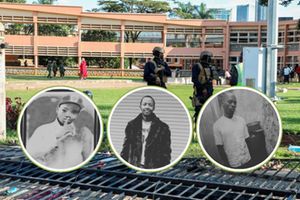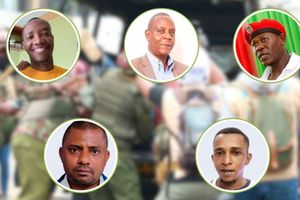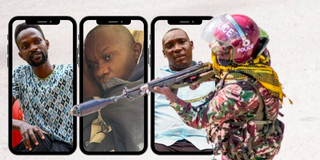
Samuel Kinyanjui (left), Brian Mwangi and Rodgers Mwabe. They sustained lifelong injuries during the 2024 anti-government protests.

The memory of last year’s protests will always be a sore one for 29-year-old Brian Mwangi. Thanks to a stray bullet that hit him, he now lives at his maternal aunt’s home in Ruiru, depending on his male cousin to change his diaper, bathe and dress him, a nurse to dress his bedsores and change his catheter, and his aunt and uncle to sort his bills.
He reminisces the freedom of his past life, making a living by fixing car tyres, being a freelance barber, and occasionally working at a car wash in Karatina town. Now, his wheelchair, purchased for him by his friends from Karatina, dictates how far he can move.
On the fateful day, he lost consciousness after being shot and only came to at 9pm at Karatina Hospital. Two days later, he was transferred to Kenyatta National Hospital (KNH), where he waited for over seven months for the bullet lodged in his spine to be removed.
“The surgery was delayed because I developed bedsores that had to heal before the surgery could happen. However, prior to that, doctors were hesitant, saying it was too risky,” recalls Mwangi. “That bullet injured me badly. I can’t do anything for myself anymore. That is what the government did to me.”
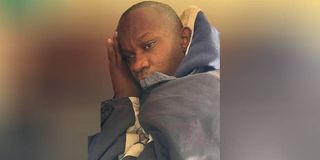
Brian Mwangi speaks at Kenyatta National Hospital on March 21, 2025.
On May 15, a terrified Mwangi was wheeled into the theatre for a six-hour surgery; 11 days later, he was discharged. Thankfully, the hospital waived his bill.
“It was refreshing to be outside once more, to feel the air on my skin, and to see my relatives and friends,” says Mwangi.
However, his journey is far from over. He currently awaits admission to the Kenya Spinal Injury Hospital for therapy and rehabilitation.
“I used to be a hard-working man with plans to set up my own barbershop and a car wash. Sometimes, I feel hopeless, wondering whether those dreams will come to fruition. It hurts to sit with the fact that the government hurt me this much, yet I wasn’t robbing anyone,” he says.
Mwangi, however, remains largely hopeful that his future will be bright.
“One day, I will rise. One day, I will walk again. It is not the end of life. I am truly grateful that Kenyans supported me and prayed for me, I would have given up already,” he says.
His aunt, Esther Mwangi, is worried about the future.
“We buy him diapers every five days, each packet going for Sh1,000. We also have to pay for his nurse, who comes here every two days to dress his wounds. We pay for her transport to and from her clinic and for the service. We are also supposed to attend monthly clinics at KNH for review, for which we have to hire a taxi that charges us at least Sh6, 000 to and from home,” she says.
She also explains that she has received calls from the Independent Policing Oversight Authority (Ipoa), who only took hers and Mwangi’s details. IPOA, she says also asked her whether the hospital had handed her the bullet. “The hospital retained it,” she told them, and the line went dead.
Samuel Kinyanjui’s life also took an unforeseen turn on July 16, 2024 in Githurai. An accountant by profession, but a high school tutor at the time, he left home around 3pm to join some colleagues, came across protests and decided to join in.
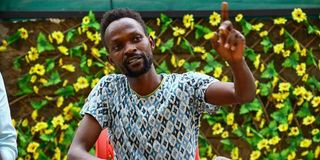
Samuel Kinyanjui, a survivor of police brutality, during an interview in Kileleshwa, Nairobi, on June 20, 2025.
Police officers dispersed them with tear gas, despite their assurances of peaceful intent. This aggravated non-protesting residents, who joined the youth. What started as a small gathering quickly escalated into a large protest. Amidst the chaos, Kinyanjui received an important call and sought a quiet spot to answer it.
“I was leaning on a building, talking. I felt a forceful push and then a sharp pain. I looked down to see a hole on my right thigh and blood. I quickly realised I’d been shot. The next thing I knew, I was being picked up and taken to KNH,” he recalls.
“I woke up the next day in bed, having undergone an operation. The doctor informed me that the bullet had hit a bone and split three times. He said that they had managed to remove two bullet segments, and left one that they deemed unresolvable. However, an x-ray shows that the bullet is whole, and I can still feel it beneath my skin,” he adds.
Due to intense pain, he underwent a second surgery after five weeks to fix nerves that had been affected. However, the surgery did little to give him relief. He was eventually discharged on September 9, almost two months after being shot, and put on pain management.
“My leg isn’t paralysed, but my foot is significantly numb, and droops, requiring therapy. Since my discharge, I haven’t been able to attend any of the scheduled clinics because I can’t afford the bills. It’s difficult to even manage daily expenses, let alone pay for ongoing medical care,” he says.
Kinyanjui had gotten married in December 2023, and his wife was six months pregnant when he was shot. Due to his condition and inability to provide, she returned to her maternal home for delivery and post-partum care.
“I haven’t seen our son. Our relationship is strained because I’m completely dependent and unable to provide for them. My daily life is now largely confined indoors. It’s risky for me to be outside due to temperature sensitivity. I’m on daily medication, including injections, which I administer myself,” he says. He hopes to undergo a procedure to properly align his foot, and remove the bullet.
For Rodgers Mwabe, the one-year anniversary of the Gen Z demonstrations also marks one year of amputation. As a Jua Kali artisan in Nairobi, he had mastered the means of putting food on the table.
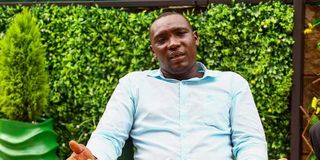
Rodgers Mwabe, a survivor of police brutality.
June 25, 2024 started as a normal day for him at work in Kahawa Sukari. At around 5pm, he sought to board a matatu to his home in Kasarani. But due to the skirmishes, there were few vehicles operating. After waiting, he decided to walk together with others, that is when they met anti-riot police in Githurai, Carwash area.
“When they started throwing tear gas and shooting, I sought a spot to hide. I was unlucky, and was shot on my left leg. While people fled, my now numb foot couldn’t move, and I sat on the road for 20 minutes, before people came to my rescue and rushed me to a nearby health facility,” Mr Mwabe recalls.
He was transferred to Thika Level 5, then later referred to KNH after X-ray results revealed that a bullet was lodged around his knee.
“At KNH, I was told that the nerves in my leg were dead. It took weeks to accept his new reality, but my children were more shocked. They asked me where I had left my leg. I had to lie to them that I had left it in the hospital and would go for it,” he says. Even though he received a prosthetic leg from Safaricom, he doesn’t use it often due to skin irritation, and that it also limits him from going back to work.

Emmanuel Tata, who died after inhaling tear gas at Mwembe Tayari in Mombasa County during protests against the Finance Bill 2024.
In Mombasa, two families continue to mourn the loss of their sons—Joash Ombati and Giggs Emmanuel Tata—who died during the chaos. Their deaths, caused by police brutality and tear gas exposure, respectively, remain unresolved, with no accountability or communication from the state.
Joash’s father, Jason Ogutu, recalls the day his son failed to return home from job hunting, only to receive a call from the Red Cross saying Joash had succumbed to gunshot injuries. Joash left behind a wife and two children, who now depend on Mr Ogutu.
Mr Paul Tata says his son Giggs died after tear gas exposure. His attempts to seek justice through Ipoa have been fruitless, with the case reportedly stuck at the Office of the Director of Public Prosecutions. “Compensation might help, but it means nothing without justice,” he says.
Additional reporting by Jurgen Nambeka.



